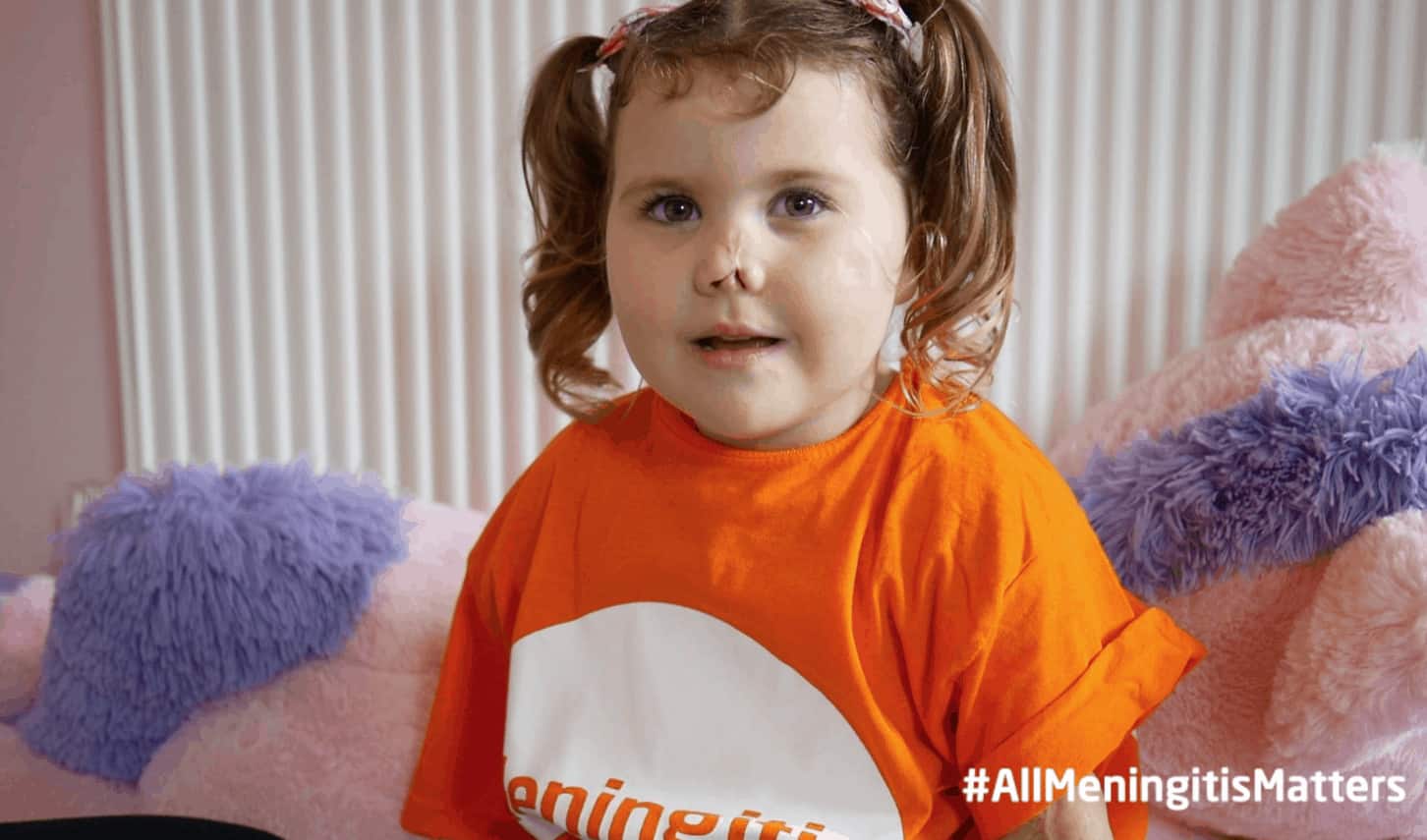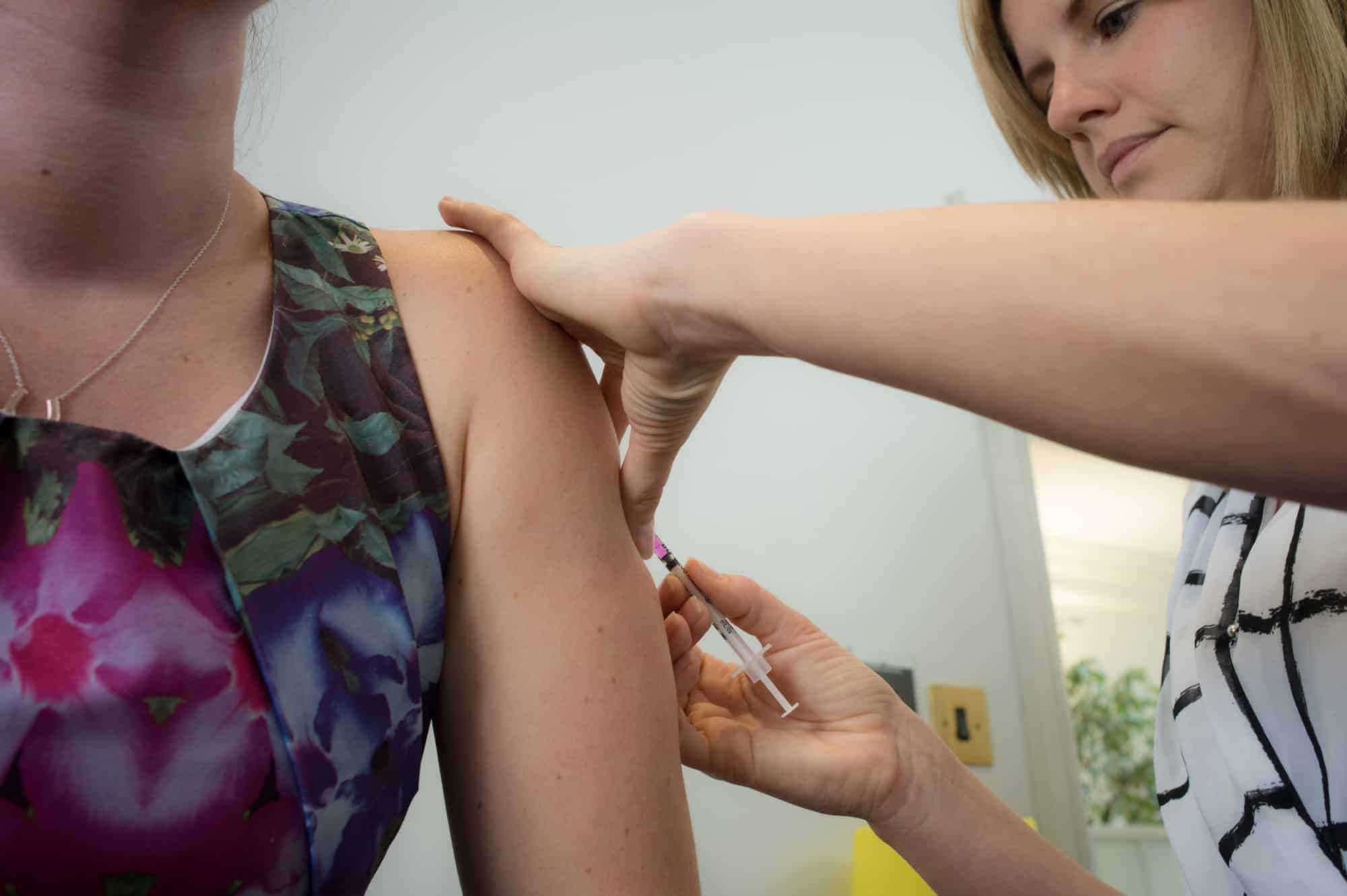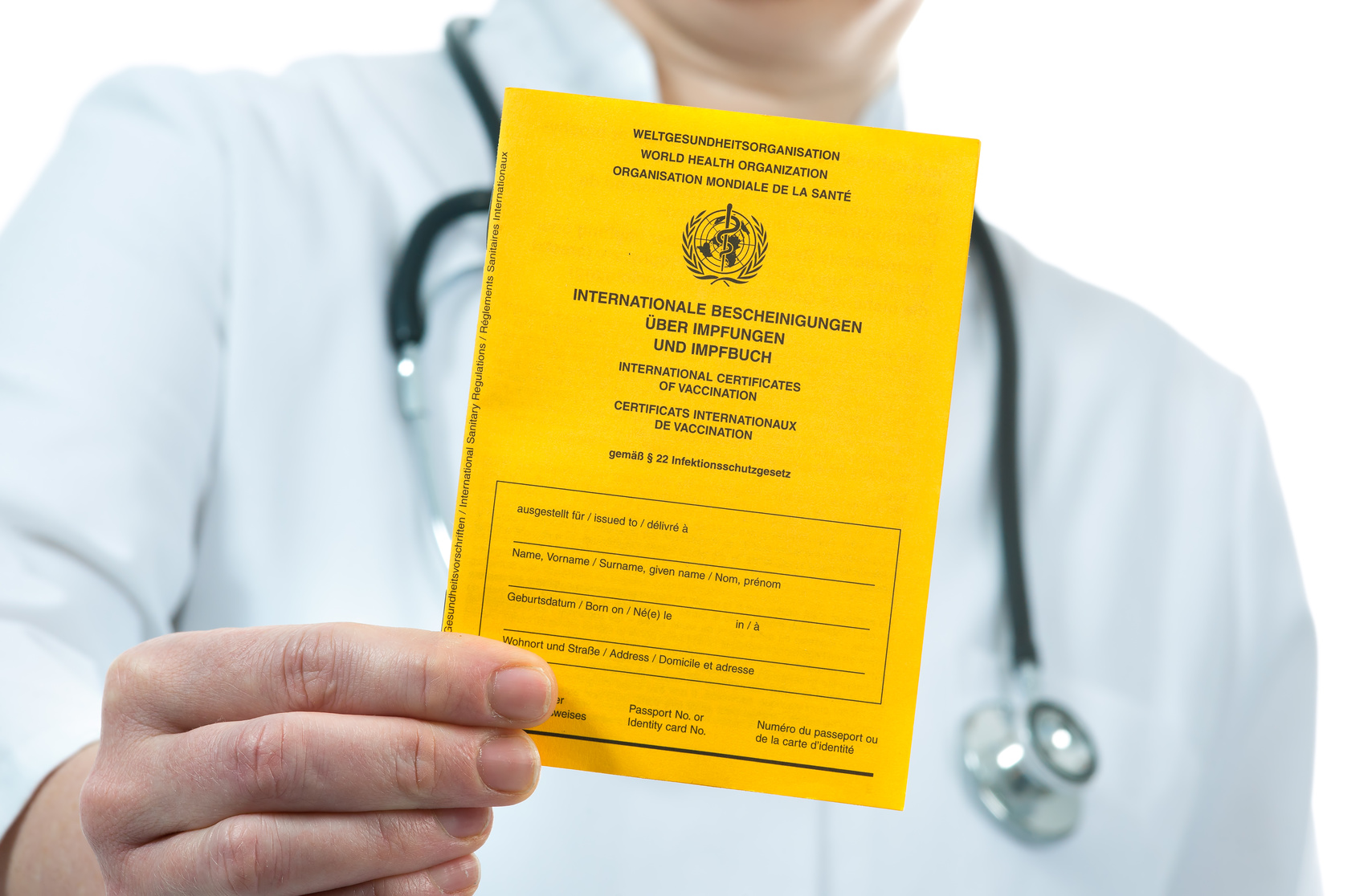Category: News
Recent media reports have raised awareness of the effects of Meningitis B and the importance of the meningitis vaccine (if your child is aged under 12 months, the vaccine still readily available via your NHS doctor). Less well-known is the fact that there are different strains of Meningitis, with different vaccines protecting against them.
Strains and Meningitis Vaccines:
- Meningitis B: the protective single-strain meningitis B vaccine is Bexsero
- Meningitis A C W Y: the 4-strain vaccines Menquadfi and Nimenrix offer protection.
Meningococcal Meningitis and its Symptoms
Meningococcal meningitis is a bacterial infection that causes inflammation of the protective membranes surrounding the brain and spinal cord. It can affect people of any age, but those most commonly affected are children under 5, and teenagers and young adults heading off to university.
Initial symptoms may be similar to flu, progressing to:
- A high temperature/fever, with cold hands and feet
- Vomiting
- Refusal to eat
- Drowsiness
- Floppy and unresponsive
- Rapid breathing
- Neck stiffness
- Bright light sensitivity
- Pale, blotchy skin, and a red rash that doesn’t fade when a glass is rolled over it
- Convulsions or seizures
Further information: https://www.meningitisnow.org/meningitis-explained/
The specialists at the Fleet Street Clinic recommend getting your children vaccinated not just against Meningitis B, but against Meningitis A,C,W & Y strains as well (the vaccine is currently available and in stock).
Meningitis B Vaccines Availability
We currently have a good supply of Meningitis B vaccine, available on a first come, first served basis. You can book a Meningitis B vaccination appointment online.
From Sunday, June 12, 2022 at 12:01AM ET all COVID-19 testing entry requirements for international travellers to the United Stated were rescinded.
Arrivals no longer need to show proof of a negative Covid-19 test or documentation of recovery prior to boarding a flight to the U.S nor upon arrival.
The Centre For Disease Control (CDC) has reached the decision based on the high vaccine uptake and widespread population immunity.
In the statement they released, they explain; “The COVID-19 pandemic has now shifted to a new phase, due to the widespread uptake of highly effective COVID-19 vaccines, the availability of effective therapeutics, and the accrual of high rates of vaccine- and infection-induced immunity at the population level in the United States. Each of these measures has contributed to lower risk of severe disease and death across the United States. As a result, this requirement which was needed at an earlier stage in the pandemic may be withdrawn.”
Most countries, including the UK, have already abandoned testing requirements in a bid to return international travel to pre-Covid levels and it seems the CQC have decided it is now time for the U.S to do the same.
Does this mean that the COVID-19 pandemic has ended?
No, but it does signify a shift in the pandemic. As we see a worldwide reduction in covid cases and death rates, the CDC statement clarifies that whilst testing may not be necessary right now, they will continue to monitor the data and adapt accordingly.
They state; “CDC continues to evaluate the latest science and state of the pandemic and will reassess the need for a testing requirement if the situation changes”.
What about covid vaccinations…
Do I need to be vaccinated to travel to the U.S?
Yes, foreign travellers from outside of the U.S are required to be double vaccinated from COVID-19 to enter the country. But for people under the age of 18, U.S citizens/ nationals or lawful permanent residents will be exempt from vaccination requirements. Currently, the Covid Booster vaccination is not a requirement and there is no set expiry date on the first dose of vaccination.
Overall, the easing of the US Covid restrictions is welcome news to the travel and tourism industry and demonstrates the possibility of international travel returning back to its pre-covid levels.
However, the absence of masks, vaccines, or travel mandates does not mean that the risk of catching Covid-19 has gone away.
We strongly recommend:
- Having comprehensive travel health insurance for all travel to the USA – hospital care should you require treatment for Covid is very costly.
- Wearing a high filtration (N95 or FFP3) mask during your journey
- Practising all the usual hygiene recommendations during your journey (e.g. hand sanitisers, distancing where possible
- Having an early test and avoiding travel if you have even minor symptoms.
For more information on the covid testing services available at Fleet Street Clinic.
With monkeypox cases being recorded in over 20 countries across the globe, people are becoming increasingly concerned about its spread and transmission.
Following 2 years of the Covid-19 pandemic, this outbreak has reignited the public’s fear and uncertainty of infectious diseases.
Whilst the media coverage of the monkeypox outbreak is alarming, we would like to reassure our patients that as it stands, the risk is still very minimal and vaccination is not advised as a precautionary measure. Whilst vaccines will undoubtedly be a key part of containing the outbreak, for now, only people who may have been exposed are being offered vaccination.
Our Medical Director & Travel Medicine Specialist, Dr Richard Dawood explains;
“Lots of people have been getting in touch with us to ask about a monkeypox vaccination, but this is not available privately. It is currently only being offered to anyone identified as a direct, close contact of a confirmed case deemed to be at sufficient risk.
The current outbreak does, however, highlight the need to think about your vaccine protection more generally, whether for travel or simply to protect your health and well-being, taking advantage of the best vaccines currently available.”
In a more general sense, it is never too late to catch up on childhood vaccinations, incomplete vaccination courses or any required boosters.
Your immune system naturally decreases with age and certain diseases are also more prevalent in older adults so there may be new vaccinations which are now suitable for you to consider for preventable diseases. Some health conditions can also weaken the body’s immune response, making you more vulnerable to infectious diseases, complications and hospitalisation. Therefore, it is important to ask your GP which vaccinations would be suitable for keeping you healthy.
– For more information on wellness vaccinations.
If you are travelling soon and haven’t had a travel consultation with a travel nurse, perhaps it is time to consider one. Travel nurses are experts in travel health and will advise which travel vaccinations & medications you should consider based on the risk of where you are travelling to and your itinerary once there.
– For more information on travel consultations.
To conclude, we’d like to dismiss a couple of dangerous myths about monkeypox that are unnecessarily scaremongering the public:
Myth 1: Monkeypox is as contagious as COVID-19 or smallpox
Fact: Monkeypox is far less contagious compared to smallpox, measles, or COVID-19.Myth 2: Monkeypox is a new virus.
Fact: No, the monkeypox virus is not a novel virus. It’s a known virus and is generally seen in central and western African countries as localised outbreaks.In summary, we, like the rest of the medical field, will be keeping a close eye on the progression of the Monkeypox outbreak and should our advice change based on new information, we will update this statement accordingly.
For more information on Monkeypox.
Exercise More – Get Outdoors
Today is National Fitness Day. September is a great time to redress the balance after summer holidays and make a new exercise plan. Time to get out and get moving!
Regular exercise has many benefits – a healthier heart, increased well-being, and a better quality of life. Research shows that if you exercise with friends, you are more likely to continue to keep fit, as the social environment encourages positive associations with the activity.
Exercising outdoors can contribute to this feeling of wellbeing. Organised outdoor exercise groups have grown in popularity recently, with a wide range of community-based activities across the country. A few of the more popular outdoor exercise activities are detailed here:
Park Run – Over 1 million Britons have taken part in Park Run – the Saturday morning 5k run in local parks across the country.
Project Awesome – A free community exercise group based in London, Bristol and Edinburgh, Project Awesome is based on high-energy, early morning exercise classes designed to kick-start your day.
Good Gym – For those who’d like to combine voluntary work with exercise, Good Gym enables you to meet like-minded people to run and work together on community projects in your local area.
British Military Fitness – Operating in parks across the UK, British military fitness classes are run by serving or former members of the armed forces with recognised fitness training qualifications. Classes are graded by ability group and are for members of the public. They are designed for all abilities, from those just starting to exercise who want to lose weight, to the already very fit.
Open Air Swimming – If you’re a keen swimmer, have you ever tried swimming outdoors? There are many reported benefits to open-air swimming, which can be enjoyed all year round even in the UK, with or without wetsuits. Check Wild Swim for your nearest open-air swimming site.
Getting Fit with Fleet Street Clinic
Our podiatrists can offer advice on appropriate footwear for exercise and our dietician and osteopath can work with you to support your exercise regime, ensuring a holistic approach to achieving a long-term, healthier you.
Imagine you’re holidaying in a tropical paradise, walking barefoot on the beach. Would you consider this a health risk? What if this simple, carefree activity could turn your trip into a nightmare?
Unfortunately, this is what happened to a Canadian couple in the Dominican Republic, who contracted hookworm in Punta Cana after walking on the beach without shoes.
Fleet Street Clinic’s medical director, Dr Richard Dawood, is Telegraph Travel’s medical expert and shared his medical opinion on the case in a recent article.
The article details the story of the couple, who shared their plight on social media to raise awareness of the parasitic worm infection.
Hookworm can infect humans if soil contaminated with their larva comes into contact with bare skin. Most commonly, hookworm infection can occur in Africa, the Americas, China and south-east Asia, according to the NHS.
Dr Dawood explained to the Telegraph how you can spot a hookworm infection:
“Typically there is a linear rash that follows the track of the migrating larva. It can become almost unbearable itchy, much worse than an insect bite, which is an important clue. There’s a local allergic reaction, which can then blister, making the line pattern harder to spot.”
And how to treat: “There are a number of different anti-parasitic treatments that work, either taken as tablets, or made into a cream and applied locally. The larvae can sometimes also be killed using cryotherapy to freeze them. Blisters or scratching can easily lead to infection, necessitating antibiotic treatment.”
To avoid hookworm, avoid coming into contact with soil or sand that could be contaminated. If walking on the beach, it’s advisable to wear shoes at all times!
Dr Richard Dawood at Fleet Street Clinic
Dr Richard Dawood is founder of Fleet Street Clinic in London and has practiced for over 35 years. He was one of the first doctors in the UK to establish Travel Medicine as a distinct speciality. Richard is the most senior UK travel medicine specialist working exclusively in a private setting.
You can book a travel consultation appointment online.
How to Cope During a Heatwave
The UK is currently experiencing a heatwave with temperatures rising to 35 degrees in some parts of the country this week. While sunshine is welcome and the vitamin D is much needed, too much heat can lead to illness. To avoid any heat-related sickness, make sure you are well-prepared! Follow Fleet Street Clinic’s tips to help keep safe during the hot weather.
Risks During the Heat:
- Exposure to such high temperatures increases sweating, and results in loss of fluid and electrolytes causing rapid dehydration. This can result in heat exhaustion or heatstroke which can be life threatening if not dealt with promptly.
- The highest risk groups are the elderly, babies, children and those with pre-existing medical conditions.
- If you engage in strenuous physical activity this will increase the risk of illness related to the heat.
Top 7 Tips For Beating the Heat
- Seek shelter and shade during the middle of the day (11am -3pm).
- If you are outside, ensure you protect your skin against the sun with a high factor sun cream, hat and sunglasses.
- Wear loose fitting, light-weight and light colour clothing.
- Keep hydrated by drinking plenty of fluids and eating food with a high water content (such as fruit).
- Ensure you are taking in sufficient salt in your diet (sweating leads to electrolyte and salt depletion).
- Avoid caffeine and alcohol, which can worsen heat-related illness.
- Heat stroke can be a life-threatening emergency and medical help should be sought.
About Fleet Street Clinic
Fleet Street Clinic is an independent healthcare practice in London. For more advice or to book an appointment with our expert medical team, you can book online.
What is HPV?
Human Papillomavirus, or HPV, is the name of a group of viruses with around 200 different types, that is most commonly passed on via genital contact.
Although HPV is highly common, 90% of HPV infections go away by themselves and do not cause any harm. Most people with HPV never develop symptoms or health problems.
However, it is possible for HPV infections to persist and cause cellular change in your body. This can lead to:
- Cancer of the cervix, vulva, and vagina in women
- Precancerous lesions in men and women
- Genital warts in men and women
- Head and neck cancers in men and women
HPV vaccines have a well-established role in preventing cervical cancers as well as these other aforementioned conditions.
Who Should Be Vaccinated against HPV?
In theory, HPV vaccines are best given to young people before they become sexually active, and therefore before they can be exposed to HPV.
Individuals who are already sexually active might also benefit as they may not have yet acquired all of the HPV strains covered by the vaccine. Patients aged under 16 can only be vaccinated with their parents present.
Why Boys should receive the HPV Vaccine
- About 15% of UK girls who are eligible for vaccination are currently not receiving both doses. This figure is much higher in some areas
- Most older women in the UK have not had the HPV vaccination
- Men may have sex with women from other countries which have no vaccination programme
- Men who have sex with men are not protected by the girls’ programme
- The cost of treating HPV-related diseases is high: treating anogenital warts alone in the UK is estimated to cost £58 million a year, while the additional cost of vaccinating boys has been estimated to cost about £20 million a year
Source: HPV Action
To book an HPV vaccination for yourself or your child, you can book an appointment online. Or find out more information about HPV here.
We are very sorry to hear that Interhealth is ceasing to trade. As a hugely respected health practice, it is a great loss for Travel Medicine in the UK.
Fleet Street Clinic is in contact with Interhealth to offer support and provide continuity of medical care for existing individual and corporate Interhealth clients as required.
If you are looking for continuity with Interhealth services as an individual, or if you require corporate services such as Occupational Health and Travel Healthcare including travel vaccinations, please get in touch.
For more information please call Fleet Street Clinic on 0207 353 5678 or email at info@fleetstreetclinic.com
Stoptober is a good time to reflect on smoking habits and how to improve health issues related to tobacco use.
Quitting smoking is one of the most effective ways you can improve your health and the benefits start almost immediately. And remember, it’s never too late to quit!
The benefits of stopping smoking
After 20 minutes
Blood pressure and pulse are normalised, blood circulation improves.
After 8 hours
Levels of carbon monoxide in the blood decrease.
After 48 hours
Your sense of smell and taste are improving.
After 2 to 3 days
Less or no phlegm in the throat, fewer breathing difficulties.
After 5 to 7 days
Your breath is fresher, your teeth are cleaner and energy levels higher.
After 2 to 3 weeks
Physical withdrawal symptoms will stop, and you can now go several hours without thinking about smoking. Your risk of blood clots (thrombosis) is reduced.
After 4 weeks
Coughing, blocked sinuses and breathing difficulties should subside. The lungs are better able to resist infection.
After 2 to 3 months
Lung function improves by 5%.
After 1 year
The risk of developing cardiovascular disease is halved.
After 2 to 3 years
The risk of developing severe pneumonia or flu is the same as for a non-smoker. Your risk of heart disease, angina (chest pains) and stroke continues to fall.
After 5 years
The risk of throat, oesophageal and bladder cancer is halved.
After 5 to 10 years
The risk of developing cardiovascular disease or thrombosis is the same as for a non-smoker.
After 10 years
The risk of lung cancer is halved. The risk of developing osteoporosis decreases.
After 15 to 20 years
The risk of lung, throat, oesophageal or bladder cancer is the same as for a non-smoker. But heavy smokers (20 a day) have double the risk of lung cancer for the rest of their lives.
Help with quitting
If you need any advice or help to stop smoking, you can book an appointment with one of our GPs.
Measles Outbreak – What You Need to Know
The WHO has issued a warning about recent outbreaks of measles in Europe and the USA. Cases of measles have risen rapidly in recent months in Italy, Romania and most recently in US.
Measles is a highly contagious virus with potential for serious complications.
Initial symptoms can include:
- Runny nose
- High Temperature
- Spots in the mouth
- Aches and pains
- Sore eyes and swollen eyelids
A rash appears after 2-4 days which can present as blotchy spots, often starting at the head and progressing down.
Medical Advice for Measles
If you think you may be suffering from measles, or are concerned about risk of infection when travelling, please see your doctor straight away.
Travelling to areas with a risk of measles
Make sure you are up-to-date with your vaccinations before you travel, including the measles, mumps and rubella (MMR) vaccine. If your child will be travelling, the MMR can be given from 6 months of age. If you have not had measles or if you have not had two doses of MMR, you may be at risk. Measles is easily passed from person to person and can be a serious illness in adults as well as children. It is never too late to have the vaccine.
Call Fleet Street Clinic for medical assistance, advice on vaccinations and travel precautions on 0207 353 5678 email info@fleetstreetclinic.com or book online now.
FINISHING THE LONDON MARATHON
The 2018 London Marathon is just around the corner! Are you preparing for the run this year? If so, you’ll be very aware of the struggle ahead. A challenge like a marathon is incredibly rewarding but also tough on the body. Increasing your exercise capacity to this level pushes the limits of endurance both physically and mentally.
But even though this can feel torturous at times, you should not ignore recurrent pain or discomfort that persists after adequate rest. A common mistake is to push through and wait until pain prevents training before seeking care. By then, prolonged time off is often necessary to heal. It is estimated that 50 to 70 percent of first-time marathon runners drop out before their race.
If you do pick up an injury:
- First and foremost, stop and get it assessed.
- Maintain your strength and endurance as much as possible while recovering from your injury. If it prevents you from running, low-impact cardio exercise such as swimming, cycling or pool running can continue to improve exercise tolerance.
- Don’t be over-anxious to return to running, a good indicator of readiness is once you can walk for 30 minutes without pain during or after, you can begin a slow, careful return to pain-free running.
- Do not push through the pain.
Moving forward
As you increase your training and running, consider a biomechanical assessment. Slight problems in gait caused by many issues from footwear to posture to old injuries can cause new injuries (knees are particularly susceptible), or cause you to have to slow your pace or walk during the race.
Listen and respond to your body throughout training and recovery, and that finish line is waiting for you!
Post race
As you can imagine, a marathon takes its toll on the body in many ways. A post race assessment is well worth it, to identify any issues caused, not to mention a treatment to work out some of that lactic acid and to restore full function to the joints and muscles.
Our osteopath Andrew Doody and podiatrist George Hill can help with any marathon-related complaints. For more training tips and advice, or marathon injury treatment you can book an appointment online.
ESSENTIAL CHICKENPOX VACCINE FACTS:
- The chickenpox vaccine is not given by the NHS, but is part of the childhood vaccination schedule in other countries
- Chickenpox is a highly contagious infection caused by the varicella zoster virus
- In the UK, it mostly affects children
- It can be itchy and uncomfortable, can leave scars, and can sometimes cause severe disease – adults may suffer more serious symptoms, including pneumonia
- Chickenpox is spread by inhaling droplets coughed up by people infected with the virus
- People with chickenpox become contagious about 2 days before the appearance of the rash, which can make it difficult to avoid infection
- The chickenpox vaccine (varicella vaccine) can be administered from the age of twelve months onwards
- Two doses of vaccine are needed, with a 4 week gap between doses
- If your child is receiving the MMR vaccination or a Yellow Fever vaccine, the varicella vaccination must either be given on the same day, or 4 weeks later
HOW TO BOOK A VACCINATION APPOINTMENT
Fleet Street Clinic is dedicated to maintaining a good supply of the chickenpox vaccine.
Our private chickenpox vaccine service is undertaken by doctors and nurses with long experience of vaccinating children. Our family friendly clinic is sympathetic to parents’ needs and concerns, and we welcome any vaccine-related queries. We operate a Saturday vaccination clinic once a month, the next will be held on Saturday April 8th.
To book your chickenpox vaccination for yourself or your child, you can book online now.
Ask the average person what viral disease they think claims the most lives, and HIV might be the likely response. However, this is not so, according to research in the Lancet. The research suggests that viral hepatitis caused 1.45m deaths in 2013 compared to 1.2m lives claimed by AIDS in 2014. What is Hepatitis?
Hepatitis is best defined as an inflammation of the liver caused by the hepatitis virus. There are 5 types of hepatitis virus called; A,B,C,D and E. Contaminated food is usually the cause of virus types A and E. Types B, C and D are spread via infected bodily fluid contact. Virus types B and C lead to the most deaths.
Prevention
Hepatitis A and B are vaccine preventable. Many countries offer these vaccines routinely on the childhood schedule but this is not the case in the UK.
Hepatitis Vaccination at the Fleet Street Clinic
Vaccinations are needed to give protection against hepatitis A and B and they currently are not part of the childhood vaccination schedule in the UK. At the Fleet Street Clinic, we make it a priority to have a good supply of hepatitis A and B vaccines for children all year round. The hepatitis vaccinations can be given individually, or as a combined injection. For long lasting protection, several doses are required. Our vaccination team are highly trained, well-qualified and have dozens of years’ experience between them. Our vaccination service takes place in a clean, comfortable and safe environment.
You can learn more about our vaccinations here.
While hepatitis is causing millions of fatalities across the globe, you can take steps towards protection against the virus by booking an appointment for hepatitis vaccinations at Fleet Street Clinic today.
Cases of measles reported in the UK
A number of cases of measles have been reported in Liverpool and Leeds. Recent outbreaks in Europe, where countries such as Romania and Italy have been affected, are believed to have caused the increase in UK cases. To date, 17 cases in Leeds and 8 cases in Liverpool have been reported.
Measles virus
Measles is a highly infectious virus which can be transmitted to anyone who is not vaccinated, most commonly to young children. To prevent outbreaks, it is recommended that 95% of the population is vaccinated.
Initial symptoms can be similar to a cold and include:
- Runny nose
- High Temperature
- Spots in the mouth
- Aches and pains
- Sore eyes and swollen eyelids
A rash appears after 2-4 days which can present as blotchy spots, often starting at the head and progressing down. MEDICAL ADVICE FOR MEASLES
If you think you may be suffering from measles, or are concerned about the risk of infection, please see your doctor straight away.
Vaccination against MEASLES
Make sure you are up-to-date with your vaccinations including the measles, mumps and rubella (MMR) vaccine. Although the NHS immunisation schedule offers the vaccine to children from 12 months of age, the MMR can be given from 6 months. If you have not had measles or if you have not had two doses of MMR, you may be at risk. Measles is easily passed from person to person and can be a serious illness in adults as well as children. In 2012 there were 122,000 deaths worldwide caused by measles. It is never too late to have the vaccine.
MMR Vaccination at Fleet Street Clinic
You can book an MMR vaccination online.
Measles Vaccination
Public Health England has implemented emergency measures to ensure the Hepatitis B vaccine is protected for those who need it most, due to severe shortages in the supply of the vaccine.
The UK is a low-risk country for Hepatitis B those most at risk are babies. The Hepatitis B vaccination has recently been added to the standard NHS immunisation schedule, which is not affected by the current shortage.
Individuals can reduce their risk of contracting hepatitis B through avoiding unprotected sex and injecting drugs, avoiding getting tattoos, piercings or acupuncture when overseas, and avoiding medical or dental care in high risk countries unless absolutely necessary.
A spokesperson for Public Health England said “We think there will be shortages until early 2018 so we are urging people to make sure they are taking the right precautions while the shortage is ongoing.”
For all those needing vaccination and immunisation support, Fleet Street Clinic offers expert travel advice, occupational health assessments and a dedicated vaccination clinic with expert medics for all those needing vaccination and immunisation support.
Our Travel Clinic can provide you with all the vaccines you need.
All of our travel and wellness vaccination appointments are available to book online.
Fleet Street Clinic’s monthly Saturday Clinic will be held on Saturday, August 12th, 9am -1pm. Patients have access to all nurse services – including travel jabs and childhood immunisations.
We have good stocks of vaccines which are in short supply at the moment, such as Hepatitis A and Hepatitis B.
If you’d like to bring your children for their immunisations or if you’re travelling over the holidays and need some last-minute vaccines, we can help.
You can book an appointment online.
HPV vaccine unavailable to boys on the NHS
The HPV vaccine is now offered to girls aged 12-18 years in the UK for free by the NHS.
Since its introduction in 2008, it has already shown to be very effective in reducing the cases of cervical cancer in females*. But the HPV virus doesn’t only cause cervical cancer, it can lead to other cancers such as anal, head, neck and throat cancers. Men are as much at risk of these cancers as women, so why are boys ineligible to receive the HPV vaccine as part of the NHS vaccination schedule?
The BBC has reported the case of Jamie Rae today, to highlight the issue. Mr Rae is campaigning for the HPV vaccine to be introduced, after undergoing radiotherapy for his throat cancer which he believes could have been prevented if an HPV vaccine had been available.
The article also reports that Professor Francis Vaz, a head and neck surgeon at University College London Hospital, paid privately to vaccinate his three sons, to protect them from certain cancers like anus, penis, mouth and throat. He said he saw on a daily basis that cancers driven by the HPV virus had been increasing in the past decade.
“I regularly see the bad end of that spectrum, so I thought the vaccination would be suitable for my sons,”
– he said.
“It’s just unfortunate it wasn’t available for them on the NHS. I was happy to pay for it because I think it’s a good vaccine.”
Why boys should receive the HPV vaccine
- About 15% of UK girls eligible for vaccination are currently not receiving both doses, a figure which is much higher in some areas
- Most older women in the UK have not had the HPV vaccination
- Men may have sex with women from other countries with no vaccination programme
- Men who have sex with men are not protected by the girls’ programme
- The cost of treating HPV-related diseases is high – treating anogenital warts alone in the UK is estimated to cost £58m a year, while the additional cost of vaccinating boys has been estimated at about £20m a year
Source: HPV Action
Our HPV vaccine page explains how get an HPV vaccine at Fleet Street Clinic.
FLEET STREET CLINIC – SPECIALIST VACCINE CLINIC
Fleet Street Clinic is a specialist vaccination clinic offering all vaccinations from travel jabs, to childhood immunisations to flu vaccinations programmes.
TO BOOK
You can book an appointment online.
Around 8 in 10 people don’t know what encephalitis is and so World Encephalitis Day aims to raise awareness of this illness, which causes brain inflammation and affects 6,000 people a year in the UK and has a high mortality rate.
Symptoms of Encephalitis
Infectious encephalitis usually begins with a ‘flu-like illness’ or a headache. Typically more serious symptoms follow hours to days, or sometimes weeks later. The most serious finding is an alteration in the level of consciousness. This can range from mild confusion or drowsiness to loss of consciousness and coma. Other symptoms include a high temperature, seizures (fits), aversion to bright lights, inability to speak or control movement, sensory changes, neck stiffness or uncharacteristic behaviour.
Autoimmune encephalitis often has a longer onset. Symptoms will vary depending on the type of encephalitis related antibody but may include: confusion, altered personality or behaviour, psychosis, movement disorders, seizures, hallucinations, memory loss, or sleep disturbances.
WHAT IS ENCEPHALITIS?
Encephalitis is an inflammation of the brain. It is caused either by an infection invading the brain (infectious encephalitis) or through the immune system attacking the brain in error (post-infectious or autoimmune encephalitis).
Anyone at any age can get encephalitis. There are up to 6,000 cases in the UK each year and potentially hundreds of thousands worldwide. In the USA there were approximately 250,000 patients admitted to hospital with a diagnosis of encephalitis in the last decade.
CAUSES OF ENCEPHALITIS?
The inflammation is caused either by an infection invading the brain (infectious encephalitis) or through the immune system attacking the brain in error (post-infectious or autoimmune encephalitis). Viruses are the most frequently identified cause of infectious encephalitis (e.g. herpes viruses, enteroviruses, West Nile, Japanese encephalitis, La Crosse, St. Louis, Western equine, Eastern equine viruses and tick-borne viruses). Any virus has the potential to produce encephalitis, but not everybody who is infected with these viruses will develop encephalitis. Very rarely, bacteria, fungus or parasites can also cause encephalitis.
SYMPTOMS OF ENCEPHALITIS
Infectious encephalitis usually begins with a ‘flu-like illness’ or a headache. Typically more serious symptoms follow hours to days, or sometimes weeks later. The most serious finding is an alteration in the level of consciousness. This can range from mild confusion or drowsiness to loss of consciousness and coma. Other symptoms include a high temperature, seizures (fits), aversion to bright lights, inability to speak or control movement, sensory changes, neck stiffness or uncharacteristic behaviour.
Autoimmune encephalitis often has a longer onset. Symptoms will vary depending on the type of encephalitis related antibody but may include: confusion, altered personality or behaviour, psychosis, movement disorders, seizures, hallucinations, memory loss, or sleep disturbances.
DIAGNOSIS OF ENCEPHALITIS
Symptoms alone often do not allow sufficient ability to distinguish between the many diseases that can mimic encephalitis. Therefore, doctors perform a variety of hospital tests – it is important that investigations are carried out as soon as possible as prompt diagnosis reduces mortality and improves the outcomes.
With increasing numbers of people travelling worldwide, it is important to highlight the risk of infectious encephalitis which can be spread by mosquitoes (Japanese encephalitis ), ticks (Tick-borne encephalitis,) or other animals (Rabies).
If you are concerned about travelling to an area with the possibility of encephalitis infection, please visit our country vaccination guide for specific advice on your destination.
Information from The Encephalitis Society
You can protect yourself from Japanese Encephalitis and Tick-borne Encephalitis with vaccinations. Book your travel vaccination appointment today.
HEPATITIS A and Hepatitis B VACCINES AT FLEET STREET CLINIC LONDON
Although Hepatitis A and Hepatitis B vaccinations are currently in short supply in the UK and globally, Fleet Street Clinic is committed to maintaining the stock of all vaccines and currently has a good supply of both.
Hepatitis A
Hepatitis A is a viral infection that is spread through food and water contaminated with the virus. It occurs world wide including Central and South America, Africa, Eastern Europe, Middle-East, Asia, and the Indian Subcontinent.
Hepatitis A affects the liver causing jaundice, and whilst most people make a full recovery, it can result in chronic liver disease and be fatal.
HEPATITIS A VACCINATION
Hepatitis A is easily preventable through vaccination, and there are several types of vaccination available in the UK that offer protection. The vaccination is available to adults and children over the age of 1 year. It can be given alone (Avaxim, Vaqta) or in combination with typhoid (Viatim), whereby a single injection provides protection for 12 months. A second injection given 6 months later will provide 25 years of protection against Hepatitis A.
The vaccination is available to adults and children over the age of 1 year. It can be given alone (Avaxim, Vaqta) or in combination with typhoid (Viatim), whereby a single injection provides protection for 12 months. A second injection given 6 months later will afford 25 years of protection against Hepatitis A.
It is also possible to receive Hepatitis A in combination with Hepatitis B (TwinRix or Ambirix) whereby 2 or 3 doses of the vaccination can be given between 3 weeks or 6 months.
In addition to the vaccination, travellers should exercise caution with food and water by:-
- Ensuring all food is cooked thoroughly and served hot
- Sticking to bottled water only with a seal or boiled water– no tap water
- Avoiding ice
- Only consuming fruit that can be peeled or sliced without contamination (such as bananas)
- Avoiding high-risk food such as shellfish, raw or rare meat, salad, buffet food, reheated food
HEPATITIS B
- Hepatitis B is a viral infection spread by contaminated blood and bodily fluids.
- 350 million people worldwide are carriers of the Hepatitis B virus.
- The highest risk countries for Hepatitis B infection are central, western and southern Africa and south-east Asia.
- Chronic infection with Hepatitis B can cause liver disease and liver cancer.
Hepatitis B is contracted through contact with infected blood or bodily fluids. These can include:
- Mother to baby transmission at the time of birth
- Unprotected sexual intercourse
- Through contaminated blood products (such as unscreened blood transfusion)
- Contaminated medical equipment (such as needles and syringes)
- Contaminated tattoo or body piercing equipment
- Through contaminated needles and syringes from injecting drug use
VACCINATION AGAINST HEPATITIS B IS ADVISED FOR:
- Those who are at occupational risk (such as health care workers, aid workers where their job puts them at risk of injury)
- Travellers who visit high-risk areas, or those who travel frequently or for longer periods
- Travellers who have pre-existing conditions whereby their condition may make it more likely for them to need medical attention
- Travellers who carry out activities associated with risk (adventure sports, body piercing, tattoos)
- Those who participate in lifestyle behaviours that may increase the risk (such as, unprotected sex and injecting drug use)
A Hepatitis B vaccine is available and can be given from birth. It requires a primary course of 3 vaccinations to be given over a 6 month period (0, 1 months, 6 months) with a booster dose given 5 years later. Those who require the vaccinations to be given more quickly, such as last-minute travellers, can receive the primary course over a shortened 3 week period. Hepatitis B can also be given in combination with Hepatitis A when protection against both diseases is required. TwinRix is available for both adults and children and adheres to the vaccination schedule outlined above. Ambirix is licenced for children under the age of 15 years and requires 2 doses 6 months apart.
BCG Vaccine Shortage in the UK
As the media has reported, the UK is in short supply of the BCG vaccine, impacted by global shortages.
The BCG vaccination gives worthwhile protection against tuberculosis, a serious infection spread by coughs and sneezes. In 2014, more than 6,500 TB cases were reported in the UK. Babies most at risk of contracting TB are those living in London and the Midlands, so if you live in these areas it is strongly recommended to have your baby inoculated.
At the Fleet Street Clinic, we have over 20 years experience as a specialist vaccination centre. We have a good supply of the BCG vaccine and run a designated BCG clinic for babies and children on Wednesday’s each week. All our vaccines are administered by highly qualified nurses or doctors, who will be happy to answer any queries or concerns.
What is TB?
TB is a bacterial infection spread through coughs and sneezes and affects the lungs, lymph glands, bones, and nervous system.
Where is the clinic?
The Fleet Street Clinic is located in Central London. Our address is 29 Fleet Street, London EC4Y 1AA.
How to Book?
With the new football season in full swing, it’s apt time to address one of the most common football injuries; hamstring pulls.
Hamstring Injury
This injury occurs when there’s a tear or strain to the muscles at the back of the thigh. By definition, hamstrings are a set of three muscles at the back of the thigh that all cross both the knee and hip joint, with only half of one (the biceps femoris) originating from the thighbone. Rapid acceleration movement is the main course of hamstrings getting injured. With football being a sport that relies heavily on quick movement in this area of the body, it is an injury your favourite footballer is highly likely to suffer from this season. There are three levels of severity to hamstring injuries. These are:
- Grade 1 – a minor strain
- Grade 2 – a partial tearing of the muscle
- Grade 3 – a complete tearing of the muscle
Symptoms of Hamstring Injury
This depends on what grade of the injury the player has.
- Grade 1 injury – consists of tenderness and sudden pain at the back of the thighs. Muscle strength will likely remain the same, but moving the leg might be painful.
- Grade 2 injury – more painful and more tender. Some bruising and swelling could occur in the area. There will also be a loss of strength in the leg.
- Grade 3 injury – have grade 1 and 2 symptoms at a more severe level. A popping or snapping sensation may be felt. The injured person may struggle to even be able to stand.
Treatment
There are initial steps that can be taken to treat hamstring injuries including compression, applying ice, elevation and good rest. Taking painkillers such as paracetamol can help reduce pain. Full recovery time will depend on the grade of injury. Professional footballers have access to equipment and health professionals that can help speed up recovery. Although self-treatment is an option for the everyday person, seeing a healthcare professional is advised if you’re concerned the injury is severe, the symptoms worsen or healing is very slow.
Osteopathy Treatment for Hamstring Injuries
Osteopathy is a medical specialty focused on musculo-skeletal problems. An osteopath deals with diagnosing, management and treatment of these types of injuries. If you’re concerned that you might be suffering from a hamstring injury or your self-treatment is not working out, book an appointment online and we can book you a session with Andrew Doody, our osteopath.
Prevention of Hamstring injury
There’s no surefire way of preventing an hamstring injury but there are steps that can be taken to reduce the likelihood. These include;
- Gentle stretching the hamstring area after exercise
- Warming up
- A longer warm-up period in cold weather
- If you feel any tightness, you might want to stop as this could be a signal that a tear might occur
BCG Vaccine for Children
At the Fleet Street Clinic in Central London, we have been providing specialist vaccination services for over 20 years. Our excellent relationship with a range of suppliers enables us to maintain good stock levels of vaccines, even where there may be supply shortages elsewhere.
We run a BCG clinic once a week for babies and children under the age of 6. Our baby/child BCG clinic runs on Wednesday’s.
Why have the BCG Vaccine?
The BCG vaccine protects against tuberculosis. TB is a bacterial infection that affects the lungs in most cases but can affect other parts of the body such as the bones and kidneys. Typical of many bacterial infections, tuberculosis can be spread through long-lasting exposure to an infected person via sneezing or coughing. The BCG vaccine is a proven way to ensure protection against the tuberculosis bacteria.
Vaccination for Babies and Children Under 6 years of age
The BCG vaccination is not offered to all children by the National Health Service. Some NHS boroughs do offer it as routine but are unable to supply at present due to the national shortage. The TB vaccination has to be sourced privately instead. With two decades of experience providing vaccination services, the Fleet Street Clinic provides a safe, child-friendly environment and the guarantee of an expert medical support service.
To protect your baby with the BCG Vaccine, you can book an appointment online.
There is currently an outbreak of Cyclospora related to travel in Mexico.
A Public Health England Health Protection Report highlights 204 confirmed cases since June 1st, 2016.
The cases are mainly associated with travel to Mexico, specifically the Riviera Maya Coast. The average incubation period is a week and infection is characterised by watery diarrhoea, fatigue, muscle pain, weight loss, nausea and low-grade fever. The foods previously involved in cyclospora outbreaks include soft fruits, such as raspberries, and salad products such as coriander, basil and lettuce. If untreated the illness can last for several weeks.
The Fleet Street Clinic can run a stool sample test that can diagnose Cyclosporiasis among many other causes of diarrhoea in returning travellers, and you will get your reults back in an hour of the test being done. If you are worried about any symptoms you have post travel to Mexico or any other country then call our reception team on 02073535678.
Or you can book an appointment online.
Bowel Cancer in the UK
The beginning of April marked the start of Bowel Cancer Awareness month. Bowel cancer is very treatable and one of the most common cancers in the UK.
40,000 cases are diagnosed every year. 1 in every 20 people will develop bowel cancer in their life time.
Symptoms of bowel cancer are often ones that you may find difficult to talk about or explain to your doctor. Nobody enjoys an uncomfortable conversation, especially when it comes to being candidly honest about something so private but the earlier it’s diagnosed, the greater the chance of survival is. It’s difficult, but let’s talk about it.
WHAT ARE THE SIGNS AND SYMPTOMS?
- Bleeding from your bottom and/or blood in your bowel movements
- A change in your bowel habits that lasts three weeks or longer
- Sudden and unexplained weight loss
- Extreme tiredness for no obvious reason
- A pain or a lump in your stomach
AM I AT RISK OF BOWEL CANCER?
Currently we do not know what causes this cancer. We have been able to identify some factors that can increase your risk of getting the disease:
- Aged over 50
- A strong family history of bowel cancer
- Being overweight or obese
- Lack of exercise and being inactive
- Longstanding inflammatory bowel disease such as Crohn’s disease or ulcerative colitis
HOW CAN I HELP PREVENT BOWEL CANCER?
There is no way to 100% prevent bowel cancer unfortunately. Things like family history, you cannot change.
However, there are some ways you can help yourself as recommended by the NHS.
- Improve your diet – eat less processed foods and red meat, eat more fish and fibre
- It is recommended that adults exercise for at least 2.5 hours a week
- Making sure you are a ‘healthy’ weight
- Stop smoking
- Cut down on alcohol
You can read all about these tips here on the NHS website.
GET SCREENED FOR BOWEL CANCER
If you are concerned about possible symptoms and are not eligible for NHS screening (aged between 60 – 74 and registered with a GP), you can make an appointment to speak with one of our experienced GPs (male or female GP’s).
If you need advice, get in touch with our expert GP’s and dietician at Fleet Street Clinic.
To book an appointment, head to our online booking system here. Alternatively, call us on 020 7353 5678 or email us at info@fleestreetclinic.com.
India is currently experiencing a heat wave, with temperatures exceeding 47 degrees Celsius. The heat wave has now spread westwards, with temperatures in Pakistan and the Middle East reaching 50 °C. The highest temperature ever recorded was in Sweihan, Abu Dhabi at 50.5 °C.
Up to 2000 people have died in India as a result of sunstroke and dehydration related to the heat. It is expected that heat waves will continue through summer with Eastern Europe and the Balkans expecting temperatures exceeding 38 °C throughout July and august.
Exposure to such high temperatures increases sweating, and results in loss of fluid and electrolytes causing rapid dehydration. This can result in heat exhaustion or heatstroke which can be life threatening if not dealt with promptly.
Any traveller can be at risk of sun and heat related injuries, but the highest risk is in the elderly, babies, children and those with pre-existing medical conditions.
Travellers who perform strenuous physical activity will increase the risk of illness related to the heat.
It can take the body up to 10 days to acclimatize to the heat, so it is important that travellers are prepared to prevent heat related illness.
What can travellers do?
*Seek shelter and shade during the middle of the day (11am -3pm) when temperatures are at their hottest
*If you are outside, ensure you protect your skin against the sun with a high factor sun cream
*Wear lose fitting light weight and light colour clothing
*Keep hydrated by drinking plenty of fluids and eating food with a high water content (such as fruit)
*Ensure you are taking in sufficient salt in your diet (sweating leads to electrolyte and salt depletion).
*Avoid caffeine and alcohol, which can worsen heat related illness
Heat stroke can be a life-threatening emergency and medical help should be sought.
http://www.aljazeera.com/news/2015/06/heat-wave-spreads-pakistan-gulf-150603102018356.html
The Zika Virus has been making headlines recently for it’s frightening links to rare birth defects. Brazil has even gone as far as to warn women to avoid falling pregnant whilst an epidemic is rife. The link between 400 cases of new-borns with microcephaly in the north-east of Brazil is being investigate by health authorities.
The increase in microcephaly, a neurological disorder that stunts the growth of the baby’s cranium, limiting it to a circumference of less than 33cm, has increased in Brazil from 59 cases in 2014, rising to 1,248 cases throughout 2015. Typically, life expectancy for babies born with the condition is reduced. In 90% of cases, brain function is also reduced. There are currently no travel restrictions in affected areas.
How is the virus contracted?
The Zika virus is spread to people through the bite of an infected mosquito. Outbreaks have been seen across Africa, Asia, Central and South America.
What are the the symptoms and treatment?
The common symptoms, usually mild and often lasting from a few days to one week, can be a rash, fever, joint pain, and conjunctivitis. There is currently no vaccine to prevent or medicine to treat the virus. Pain killers can be used to alleviate these symptoms which often go mistaken as a fever, and can easily be missed, especially in the early stages of pregnancy.
Is there a way to reduce my risk?
Insect bite precautions is paramount, especially for pregnant women in the affected areas. The NHS travel website, Fit For Travel, recommends:
- Covering up – wearing long sleeved tops and long trousers
- Spraying thinner clothing with insect repellent
- Burning pyrethroid coils and heating insecticide impregnated tablets
- Sleeping in a screened room where possible or using a treated mosquito net
If you are travelling to Brazil or any of the infected areas, book an appointment with one of our dedicated Travel Clinic nurses for information on vaccines and travel wellbeing now on 020 7353 5678.
Zika Virus – Additional Resources
Zika virus: medical advice for travellers – The Telegraph – Richard Dawood
Zika Virus – Video
Watch Fleet Street Clinic’s Dr Richard Dawood discuss Zika Virus on Victoria Derbyshire.
The popular Thai tourist resorts of Krabi and Phuket are reporting high incidences of dengue fever this year.
Since January 2015 over 400 cases of dengue fever have been reported, resulting in one fatality.
Cases of dengue fever also soared in Malaysia with over 40,000 reported cases this year. It is estimated between 6-10 cases of dengue are diagnosed each day – double the rate of last year. The most dramatic increases have been seen in Penang, Johor and the state of Selangor.
Dengue Fever Advice for Travellers
Unfortunately, there is no vaccine or medication that can prevent dengue. The only way to reduce the risk is to prevent mosquito bites, particularly during daylight hours.
If you are off on an Asian adventure this summer, follow these simple steps to reduce the risk of dengue fever:
- Cover up with clothing
- Use insect repellents containing a minimum of 50% DEET on any exposed skin
- Consider treating clothes with permethrin
- Sleep under bed nets and use insect screens on doors.
- Reduce mosquito breeding sites by removing any water containers from outdoor areas
- Use air-conditioning
- Consider the use of plug-in electrical vaporisers which deter mosquitoes
Our Ultimate Bug Kit contains everything you need to help keep mosquitos at bay and is available to purchase online.
Fleet Street Clinic
For more information on Dengue or any other travel-related topic, you can book travel consultation appointment online.
World Malaria Day
Reaching the zero Malaria target
How You can Prevent Malaria
- Using antimalarial medication
- Spraying indoor walls and your clothing with insecticides
- Using insecticide-treated nets and window screens
- Wear light-coloured, long sleeve clothing
- Get rid of any stagnant water
Since 2017, the World Health Organization has supported a group of 21 malaria-eliminating countries through a special initiative called the “E-2020”. This report charts their progress towards a common goal: eliminating malaria within the 2020 timeline. According to this report, 8 E-2020 member countries reported zero indigenous cases of malaria in 2020, a remarkable achievement in view of the ongoing global COVID-19 pandemic. Maintaining zero cases is a testament to their commitment to protect hard-won gains and keep the disease at bay. You can find more on this report here.
More Information
Read more about malaria and how to you can prevent it.
For further information and a consultation with an experienced member of our travel team, you can book an appointment online here.
Measles on the rise:
The World Health Organisation (WHO), has reported that measles cases are on the rise worldwide and in Europe alone, outbreaks have surged to a 20-year high.
The WHO states that reported measles cases (provided by each country) currently show that about 229,000 cases have already been reported, compared with 170,000 for 2017. Worryingly the 2018 number is likely to rise as the reporting deadline ends April ’19.
With a 50% increase in measles cases last year, it is important to understand the benefits of vaccinating against measles:
Dr Richard Dawood, our Medical Director explains;
“I recently heard about a patient suffering a bad attack of shingles. She didn’t believe in doctors, medicines or vaccines, I was told, and was languishing at home, with a dreadful, crusted rash across her body, and burning with pain. She had stuck to her beliefs and refused to take antiviral medication that could have aborted the attack or reduced the probability of ending up with long term nerve damage and lingering pain. Shingles can strike more than once, but since she doesn’t believe in vaccines (there is a good one that is 95% effective) she will have to take her chances of a recurrence in future. I disagree with her opinions, but her latest actions will harm nobody but herself.
But measles is different: when it comes to vaccination, personal choices and opinions have a direct impact on the health and wellbeing of others – individually as well as for entire communities. Measles vaccination is a major public health issue. Memories of the past outbreaks, epidemics, tragic disability and loss of life that drove research and ground-breaking vaccine development now belong to a previous generation. In these days of “fake news”, “influencers” and social networks, it has become too easy to undermine confidence in matters of public health. In the case of measles, concerns about vaccine safety are down to the “fake research” of Andrew Wakefield, who was struck off the medical register for concocting a spurious link with autism in the 1990s. But the damage was long-lasting.
The complications of measles are most severe in babies who are not yet old enough to be vaccinated, and children with reduced immunity. When the rate of vaccination in the general population falls below 95%, outbreaks occur and can easily spread, with the highest impact on those most vulnerable populations, undermining years of hard work around the world to bring measles under control.
That is what is happening now”.
VACCINATION AGAINST MEASLES
‘The highly contagious disease can cause severe diarrhoea, pneumonia and vision loss. It can be fatal in some cases and remains an important cause of death among young children”, according to the WHO.
The disease can be easily prevented with two doses of a safe and efficient vaccine that has been in use since the 1960s’.
Make sure you are up-to-date with your vaccinations including the measles, mumps and rubella (MMR) vaccine. Although the NHS immunisation schedule offers the vaccine to children from 12 months of age, the MMR can be given from 6 months. If you have not had measles or if you have not had two doses of MMR, you may be at risk. Measles is easily passed from person to person and can be a serious illness in adults as well as children. It is never too late to have the vaccine.
Staying Healthy on the Slopes
Ski season is upon us, and it’s time to prepare yourself physically for your adventures on the slopes!
Skiing once a year can easily lead to injury – no surprise for such an intense activity, involving a range of muscle groups. And it’s not just skiing that’s physical; lifting skis, boots and using lifts can all take their toll on your body! In order to stay healthy this ski season, a little preparation is all that’s required.
Our Consultant Osteopath, Andrew Doody BSc (Hons), gives advice on how to avoid injuries so that you enjoy your holiday on the slopes.
Before your holiday:
- Build up your fitness gradually – walking quickly to work or weekend sessions on a cross-trainer will help you to prepare your muscles
- Start a stretching programme. Concentrate on quads, hamstrings and calves
- Don’t ignore any twinges you have – get yourself checked out by a professional before you travel
- Work on your balance – yoga postures will help
- Check your alignment; most skiers find turning one way easier than the other, which may be caused by either one-sidedness or muscle weakness
- Get professional advice on the best products to support a problem back, knees, ankles, or wrists
On the Slopes and Après Ski
- Ensure ski-boots are properly fitted. Ill-fitting boots can impact on your posture when skiing
- Warm up before you start and stop to stretch, especially at the end of the day
- Make sure to keep hydrated – easy to forget in the cold weather
- Beware when you’re walking with you ski gear! Lots of ski injuries come from carrying kit badly or slipping on ice away from the slopes
On Your Return
- Consider ways to improve your fitness level throughout the year and be well prepared for the 2018 season
- If you have any lasting pains, make sure to have a professional health check
Book an Appointment at Fleet Street Clinic
Want more professional support and advice before your ski trip?
Book an appointment to see Fleet Street Clinic’s Consultant Osteopath Andrew online.
The Fleet Street Clinic is committed to keeping journalists safe and well in high risk environments abroad.
The aim of this seminar is to provide a briefing for newsgatherers on the current crisis in West Africa, plus a hands-on training in biohazard protection.
Frontline Club, 13 Norfolk Place, London W2 1QJ
Thursday 2nd October 2014
9:30 – 14:30
The current outbreak of Ebola virus disease is unprecedented in scale and severity. The affected countries of West Africa do not have the resources or the public health infrastructure necessary to bring the outbreak under control, and massive external intervention will be needed. How long might it continue? How will it be covered as a news story? Will the need for news put newsgatherers at risk, and if so, how can risks be minimised? How should Ebola be reported upon? What impact is news reporting having upon the regional economy, and the global response?
These are some of the questions we hope to address in a special seminar aimed at print and broadcast media: bureaux chiefs, health & safety managers, and frontline news crew themselves, with a briefing from an internationally renowned expert in the field, and a practical, hands-on training session conducted by an expert in biohazard protection.
The event is free to attend, but places are limited, so please let us know if you would like to attend.
Programme
| 9:30 | Coffee, registration | |
| 10:00 | Ebola: background and analysis of the current West African outbreak | Prof David Heymann |
| 10:45 | Q&A / Discussion | |
| 11:15 | Coffee break | |
| 11:30 | Protecting News Media Personnel in a High Risk Environment: Introduction | Dr Richard Dawood |
| 11:45 | Biohazards: Principles of Personal Protection | Ian Samson |
| 12:15 | Lunch | |
| 12:45 | Biohazards: Personal Protection – Practical session | Ian Samson |
| 14:30 | Finish |
Speakers:
Professor David Heymann, CBE
David is Professor of Infectious Disease Epidemiology, London School of Hygiene and Tropical Medicine; head of the Centre on Global Health Security at Chatham House, London; and chairman of Public Health England, UK. He has frontline experience of working with Ebola in Africa, having personally investigated some of the original outbreaks in central Africa going back to 1976. He is actively involved in the current international response.
Ian Samson
Ian is the EMEA Regional Training Specialist for DuPont Personal Protection. DuPont is currently supplying personal protective equipment to the WHO, MSF and other public health and aid agencies, including tens of thousands of coveralls. Ian’s expertise in this field is well known, and he has previously trained news media personnel during other public health emergencies, such as during news coverage of avian flu in Asia, in 2005/6.
Dr Richard Dawood
Richard is the medical director of the Fleet Street Clinic, a specialist in Travel Medicine, and a consultant to several news media organisations.
Personal Protective equipment will be available for delegate training, supplied by courtesy of DuPont and CES Ltd.
A new medical paper in Lancet Infectious Diseases has highlighted some of the countries at the highest risk for a major Zika virus outbreak. The study looked at air traffic between countries in the Americas, where Zika is already established, and places in Africa and Asia where the Aedes mosquitoes, the mosquitoes that can spread Zika, are most prevalent. The study also took other factors into account such as seasonality of transmission, population density, and economics to come up with a “hit list” of countries where Zika could potentially have the biggest impact.
Countries with larger volumes of travellers arriving from Zika virus-affected areas of the Americas and large populations at risk include:
- India (67,422 travellers arriving per year; 1.2 billion residents in potential Zika transmission areas)
- China (23,8415 travellers arriving per year; 242 million residents in potential Zika transmission areas)
- Indonesia (13,865 travellers arriving per year; 197 million residents in potential Zika transmission areas)
- The Philippines (35,635 travellers arriving per year; 70 million residents in potential Zika transmission areas)
- Thailand (29,241 travellers arriving per year; 59 million residents in potential Zika transmission areas).
Of the countries with the largest at risk populations, the authors suggested that India, the Philippines, Indonesia, Nigeria, Vietnam, Pakistan, and Bangladesh might be most vulnerable to impact because of their limited per capita health resources.
Dr Richard Dawood, Medical Director and co-founder of the Fleet Street Clinic, discussed the paper with one of its authors, as well as the current situation faced by travellers, on the Victoria Derbyshire programme on BBC2 on 2nd September.
“We have always known Zika could spread everywhere Aedes mosquitoes abound,” Dr Dawood told the programme. “This study tells us about the seasonality of risk of spread, and when/where it might take root, but does not model travel/risk of spread within Africa or Asia – so more studies are still needed.”
The study’s publication coincided with the arrival of Zika in Singapore – a major hub for Asian travel and Malaysia, with clear implications for further spread. With this news came the new evidence that Aedes aegypti mosquitoes are capable of passing the infection on to their offspring.
There is currently no vaccination available for the Zika Virus. If you have any questions and would like some more information and advice, please contact the Fleet Street Clinic on 020 7353 5678 or you can book a travel consultation appointment.


























